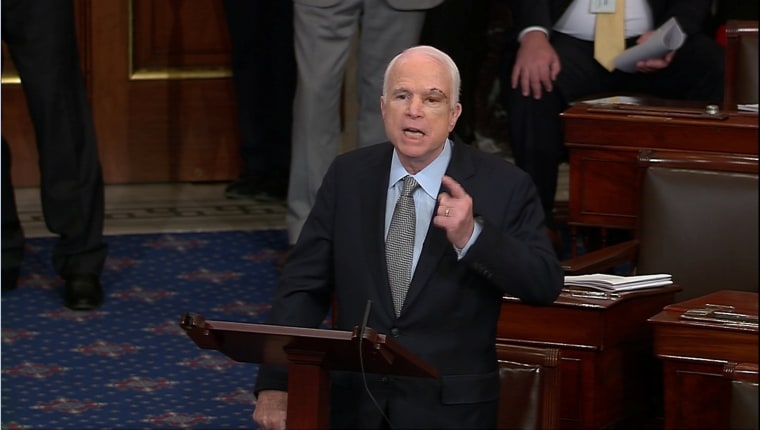Health care advocates have reason to be relieved this morning.
Senate Republicans failed to pass a pared-down Obamacare repeal bill early Friday on a vote of 49-51 that saw three of their own dramatically break ranks.Three Republican senators -- John McCain, Susan Collins and Lisa Murkowski -- and all Democrats voted against the bill, dealing a stinging defeat to President Donald Trump who made repeal of Obamacare a cornerstone of his presidential campaign.
It was McCain who ultimately cast the deciding vote in a moment of high drama on the Senate floor in the early hours of the morning.
And with that, let's have another Q&A.
What now?
Well, Senate Republicans have now run out of bills. "Repeal and replace" was voted down on Tuesday; "repeal and delay" was voted down on Wednesday; and then "skinny repeal" came up one vote short last night. Senate Majority Leader Mitch McConnell (R-Ky.) declared last night, "It's time to move on."
Right, but what does that mean in practical terms?
No one, including Senate Republicans, can answer that with any confidence. At least in theory, senators can now begin work on some bipartisan measures intended to strengthen the current system and shore up areas in which the Affordable Care Act is struggling.
How likely is that?
It's very likely there will be at least some efforts in this direction, and a couple of Senate committees have even agreed to hold hearings (something they should have done before holding votes on legislation). There are plenty of straightforward policies that both parties should be able to accept, but whether that will happen or not is anybody's guess.
But haven't we been at this point before? In March, a House Republican plan died, we all exhaled, and then it came back to life. What's to stop that from happening again?
Frankly, nothing. The makeup of the Senate will continue to pose challenges for opponents of health care, but the GOP's repeal crusade will not end anytime soon. Health care advocates will need to be vigilant.
Was John McCain's vote a surprise?
That's a matter of perspective. When he returned to the Senate this week, McCain delivered a dramatic speech in which he suggested he'd oppose exactly this kind of effort. It was unclear, however, whether the Arizonan would stick to those principles. Last night, he did.
How's Donald Trump taking all of this?
As of this moment, the president has not yet had a full-blown Twitter tantrum -- perhaps he's sleeping in? -- but he did write after the vote, "3 Republicans and 48 Democrats let the American people down. As I said from the beginning, let ObamaCare implode, then deal. Watch!"
What does that mean?
Your guess is as good as mine. "Obamacare" is not going to "implode" on its own, but the fear is Trump, who's already taken steps to sabotage the current health care system, may intensify those efforts now.
But wouldn't that make the president directly responsible for hurting people?
Yes, though Trump may very well do it anyway.
Anything else?
The reverberations from last night will linger for a while, and they should. Senate Republicans put on a ridiculous display -- and abused the legislative process in ways with no modern precedent -- all in the hopes of taking health care benefits away from millions of Americans. They came up with regressive and unpopular ideas, rejected by doctors, nurses, hospitals, insurers, and health care advocates, and they very nearly passed a bill anyway.
It may be a while until Capitol Hill feels "normal" again.
